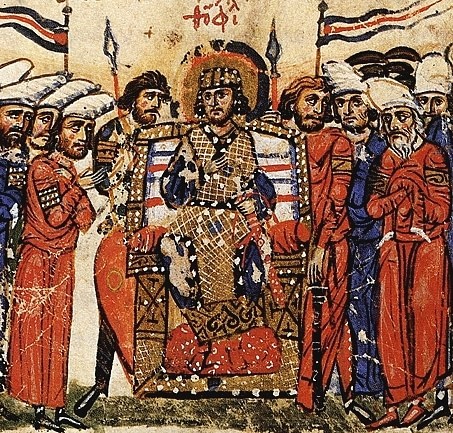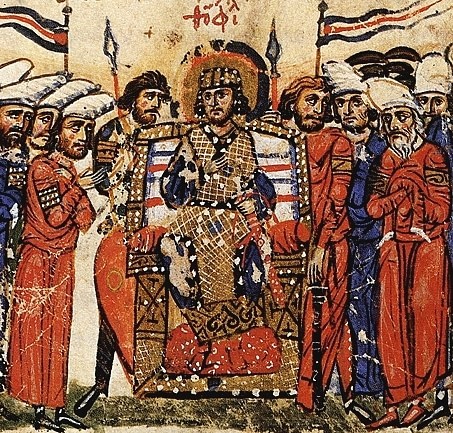#ArabCaliphate
Explore tagged Tumblr posts
Photo

Theophilos
Theophilos was emperor of the Byzantine Empire from 829 to 842 CE. He was the second ruler of the Amorion dynasty founded by his father Michael II. Popular during his reign and responsible for a lavish rebuilding of Constantinople's palaces and fortifications, Theophilos is chiefly remembered today for a major defeat by the Arab Caliphate in 838 CE and as the last emperor who supported the policy of iconoclasm, that is the destruction of icons and their veneration being treated as heresy.
Succession & Popularity
Theophilos was from Amorion, the city in Phrygia which gave its name to the dynasty begun by his father Michael II (r. 820-829 CE). Michael's reign, tarnished right from the beginning by his brutal murder of his predecessor Leo V (r. 813-820 CE), continued its downward spiral with a serious revolt led by Thomas the Slav and significant defeats at the hands of the Arabs in Sicily and Crete.
Inheriting the throne in 829 CE aged 25, Theophilos was seen as a new hope for the empire to get back on its feet again. A return to former glories was not to be but at least Theophilos was popular because of his exuberant personality, even participating once in a chariot race in the Hippodrome of Constantinople (which he won, of course). The emperor also enjoyed a reputation as a lover of learning and justice, especially when he introduced the tradition of the emperor riding to church on Fridays and permitting any commoner to throw questions of justice or appeals his way. The historian J. Herrin recounts one such episode:
On one of the occasions a widow complained to Theophilos that she had been defrauded of a horse by the city eparch. Indeed, she claimed it was the vey horse he was riding! He ordered an investigation and discovered that her story was correct: the eparch had taken her horse and given it to the emperor. Theophilos immediately returned the horse to its rightful owner and had the very high-ranking official punished. (75)
Another eccentricity of the emperor was the habit of walking about the streets of his capital in disguise asking the people what they thought of the problems of the day and checking if the merchants were selling their goods at fair prices. Theophilos' reputation for learning stemmed not only from his own education but his endorsement of everyone else's - he increased the faculties of the university at the capital, increased the number of scriptoria where manuscripts were duplicated, and ensured that teachers were paid by the state.
Continue reading...
44 notes
·
View notes
Photo

Theophilos
Theophilos was emperor of the Byzantine Empire from 829 to 842 CE. He was the second ruler of the Amorion dynasty founded by his father Michael II. Popular during his reign and responsible for a lavish rebuilding of Constantinople's palaces and fortifications, Theophilos is chiefly remembered today for a major defeat by the Arab Caliphate in 838 CE and as the last emperor who supported the policy of iconoclasm, that is the destruction of icons and their veneration being treated as heresy.
Succession & Popularity
Theophilos was from Amorion, the city in Phrygia which gave its name to the dynasty begun by his father Michael II (r. 820-829 CE). Michael's reign, tarnished right from the beginning by his brutal murder of his predecessor Leo V (r. 813-820 CE), continued its downward spiral with a serious revolt led by Thomas the Slav and significant defeats at the hands of the Arabs in Sicily and Crete.
Inheriting the throne in 829 CE aged 25, Theophilos was seen as a new hope for the empire to get back on its feet again. A return to former glories was not to be but at least Theophilos was popular because of his exuberant personality, even participating once in a chariot race in the Hippodrome of Constantinople (which he won, of course). The emperor also enjoyed a reputation as a lover of learning and justice, especially when he introduced the tradition of the emperor riding to church on Fridays and permitting any commoner to throw questions of justice or appeals his way. The historian J. Herrin recounts one such episode:
On one of the occasions a widow complained to Theophilos that she had been defrauded of a horse by the city eparch. Indeed, she claimed it was the vey horse he was riding! He ordered an investigation and discovered that her story was correct: the eparch had taken her horse and given it to the emperor. Theophilos immediately returned the horse to its rightful owner and had the very high-ranking official punished. (75)
Another eccentricity of the emperor was the habit of walking about the streets of his capital in disguise asking the people what they thought of the problems of the day and checking if the merchants were selling their goods at fair prices. Theophilos' reputation for learning stemmed not only from his own education but his endorsement of everyone else's - he increased the faculties of the university at the capital, increased the number of scriptoria where manuscripts were duplicated, and ensured that teachers were paid by the state.
Continue reading...
36 notes
·
View notes